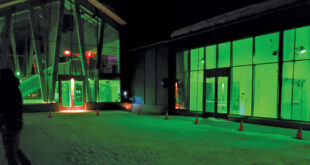“I think the timing is incredibly ill”
The Crested Butte Town Council reviewed the minutia of proposed revisions to the affordable housing ordinance on Monday. In spite of some hesitation over the impact of proposed fees on the growth of commercial development, the council primarily focused on implementation and enforcement details as they reviewed nearly 70 pages of documentation for four hours.
“This town has a lot of restrictions that add to the cost of commercial building in town—architectural codes, building codes, parking fees,” said council member Jim Schmidt. “I look at this [ordinance], and for the years of 2012 and 2013, even with the commercial rate under $30 a square foot, on a 9,300-square-foot building there’s over $200,000 in mitigation fees. I still think we’re too high.”
Under the proposed changes, the increase in mitigation rates starts at 10 percent for commercial construction and expansion, or about $29 per square foot, and increases to nearly $59 per square foot over the course of four years. The fee is meant to offset a portion of the cost of housing employees generated by new development.
Schmidt referenced information shared at the last Town Council meeting that indicated commercial development is already prohibited by the current economic climate.
Given that, he said he would like to see the mitigation fee set at 3 percent for 2012 and 2013. Council member David Owen strongly disagreed.
“I can’t support that at all. We knocked it down and knocked it down. Every time we’ve had a meeting, we’ve knocked it down. When is it going to stop?” Owen asked.
Councilperson Roland Mason said that in hindsight, he was disappointed he voted for the original revision to the ordinance, which increased the mitigation fee to approximately $82 per square foot. He felt better, however, about the current proposal and wanted to see how the new fees played out.
“Getting something down on paper is important,” Mason said, noting that the Council would always have the option to suspend the fees in the future.
Council members Glenn Michel and Shaun Matusewicz were also comfortable with the four-year implementation plan. But Gary Hartman, architect for the proposed Sixth Street Station, pointed out that commercial construction projects can take 15 months or more to get through the town’s approval process. New projects could miss the boat on the 10 percent increase, and be subject to the second-year rate of 15 percent. During this economic climate, that might not be financially feasible for a project like the Sixth Street Station.
“I agree with your ordinance, I just think the timing is incredibly ill,” Hartman said. “Ten percent is borderline [affordable], and I’ll leave it at that. I’m here tonight to listen for all the strategies I can possibly bring to the table.”
Crested Butte mayor Aaron Huckstep also worried that the revised fees were too high because they are tied to the price per square foot of homes and the adjusted median income, or AMI. With AMI unlikely to rise in coming years and the price per square foot of homes going up, Huckstep believes the mitigation rate of 10 percent will rise above $29 per square foot.
“That is really concerning to me. We’re really paying with fire here. There could be detrimental effects we may not anticipate, and I’m much more comfortable with the direction Jim [Schmidt] is talking about,” Huckstep said.
But delaying implementation for an additional two years gained little traction with the council. They opted instead to implement the four-year plan at the time of adoption rather than retroactively to the beginning of 2012.
The council did request some changes to the ordinance, including more clearly defining the type of housing unit that qualifies as affordable housing; leaving the council enough flexibility to consider alternative mitigation plans proposed by developers; and determining how to best retain the option to buy a foreclosed affordable housing property.
A few sticking points did rise to the surface like the reclassification of existing free-market structures as affordable housing, including already deed-restricted accessory dwellings that are currently limited to long term rentals but would be further restricted to locals. The council debated how these should count toward affordable housing requirements, both in terms of a direct credit to the developer or the creation of a certificate that homeowners could sell to developers. The council envisions a program where free market homeowners could deed-restrict property and create affordable housing units in exchange for certificates. Commercial developers could then purchase those certificates in order to comply with the affordable housing ordinance.
“The beauty of the certificate program is that units get created before the impact occurs, so if you deed restrict a property you get a certificate, and then someone builds the building that causes the impact and mitigation is already in place,” Owen said.
But while that process seemed straight forward for accessory dwellings, it seemed less clear for situations like a mortgaged single family home where the bank would need to approve the deed restriction. The council opted to address the latter at a later date.
They also decided to come back to the issue of HOA fees in complexes with both affordable and free market units. Owen pointed out that rising HOA fees could make an affordable unit unaffordable and suggested that reducing the unit’s sale price could be one way to counteract that. That idea ruffled some feathers among council members who worried that the original owners—who also qualified for affordable housing—would lose out.
“What we’re going to hear is the town screwed me over because they won’t let me get 3 percent out of this,” Huckstep said.
None of the larger sticking points, however, were deemed reason enough to hold up the ordinance itself. The council will review the ordinance at least one more time on Monday, April 16. While the ordinance cannot be formally adopted at that meeting, the council will likely adopt the accompanying Administrative Procedures and Affordable Housing Guidelines.
 The Crested Butte News Serving the Gunnison Valley since 1999
The Crested Butte News Serving the Gunnison Valley since 1999



